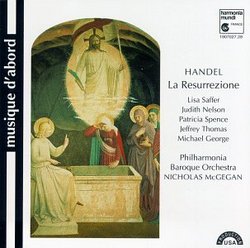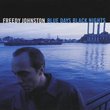| All Artists: George Frideric Handel, Nicholas McGegan, Lisa Saffer, Patricia Spence, Philharmonia Baroque Orchestra, Judith Nelson, Jeffrey Thomas, Michael George Title: Handel - La Resurrezione / L. Saffer · J. Nelson · P. Spence · J. Thomas · M. George · PBO · McGegan Members Wishing: 0 Total Copies: 0 Label: Hmf Musique D'abord Release Date: 8/12/1997 Album Type: Import Genre: Classical Styles: Opera & Classical Vocal, Historical Periods, Baroque (c.1600-1750) Number of Discs: 2 SwapaCD Credits: 2 UPC: 093046702823 |
Search - George Frideric Handel, Nicholas McGegan, Lisa Saffer :: Handel - La Resurrezione / L. Saffer · J. Nelson · P. Spence · J. Thomas · M. George · PBO · McGegan
 | George Frideric Handel, Nicholas McGegan, Lisa Saffer Handel - La Resurrezione / L. Saffer · J. Nelson · P. Spence · J. Thomas · M. George · PBO · McGegan Genre: Classical
|
Larger Image |
CD DetailsSimilar CDs
|
CD ReviewsLight and Shadow Leslie Richford | Selsingen, Lower Saxony | 04/11/2006 (4 out of 5 stars) "George Friderick Handel (1685 ? 1759): La Resurrezione. Oratorio. Libretto by Carolo Capece. Performed by: Lisa Saffer, soprano; Judith Nelson, soprano; Patricia Spence, mezzo-soprano; Jeffrey Thomas, tenor; Michael George, bass; the Philharmonia Baroque Orchestra, San Francisco (concertmaster: Elizabeth Blumenstock); Nicholas McGegan, harpsichord and direction. Live recording made at the Berkeley Festival, University of California at Berkeley, June, 1989. Harmonia Mundi USA. Originally issued in 1990 as HMU 907027.28; later re-issued as HMA 1907027.28. Total time: 1 h 46?49? [2 CDs]. There are positive and negative aspects to this recording which led me to compromise on my evaluation and give four stars. I should perhaps from the start say that I have not heard any of the rival recordings (Hogwood, Koopman, Minkowski, Combattimento Consort), so I can only judge by what I have heard of the McGegan recording. On the positive side, the first thing to mention would be Handel?s tremendous music. This is, of course, a youthful work, having been written in Rome 1707/1708 and first performed on Easter Day, 1708, in the palace of Cardinal Ruspoli. As the seat of the papacy, Rome was denied the pleasure of opera, but this prohibition was easily avoided by producing ?sacred? oratorios in Italian which differed in little or nothing from the secular cantatas and operas of the day. Thus, Handel?s ?oratorio? is, unlike many of his later English ones, an array of recitative and aria just like his Italian operas. The accompanying music is delightful, the young Handel obviously having a field day underscoring the text with all the tricks of the baroque trade. Listeners of his later works will often recognise passages that he borrowed from this juvenile work, and there really are a lot of pieces here that it would have been a great shame to forget. In particular, and this is the second positive aspect, the instrumental accompaniment seems to me to be anything but monotonous, rather the opposite: while re-examining this recording, I often found myself delighting in the strings and the woodwind in particular as well as in the continuo playing, all captured perfectly adequately by Harmonia Mundi?s engineers despite the conditions of a live performance. That is, however, where the negative side comes in. Capturing a live performance on disc is in many ways an unthankful task, and I think it is probably fair to assume that, had this been a studio recording, many passages would have been repeated and improved. In particular, I felt that the opening sonata and the first soprano aria ?Disserratevi, o porte d?Averno? were far from perfect, with what sounded like several wrong notes from the natural trumpets (these being extremely difficult to play). The decision of the engineers to have Lisa Saffer (angel) and Michael George (Satan) singing almost exclusively over the right channel and Judith Nelson (Maddalena) and Patricia Spence (Cleofe) over the left was, I feel, unfortunate, as their voices would have benefited from being a little louder and coming over both stereo channels. The singers here are, with the exception of Michael George, not up to the class employed in Europe by the likes of Sir John Eliot Gardiner, Sir Christopher Hogwood or Robert King. Michael George seems to enjoy playing the ?rogue? Satan, and the person who said he sounded like a ?walrus? was being extremely unfair. There are one or two places where the notes are perhaps too low for him, but on the whole he is the most convincing of all the singers here, really outclassing the others. Lisa Saffer does indeed produce some fireworks, especially in the opening number, but her voice seems too small to carry through all the triumphs that she has to declare. Patricia Spence has a deep mezzo that is not unpleasant. But where the whole gets very questionable is with Judith Nelson and Jeffrey Thomas. Thomas has a very light voice that to my mind can easily get rather monotonous (others praise him as "lyrical", so this is purely subjective); Judith Nelson sounds to my ears too unlike a passionate young woman (and that is what Maddalena should be). All in all, this is a performance with light and shadow and does not really match up to some of the more brilliant recordings that Nicholas McGegan and his team have produced. " Delightful, and Nicely Priced! Timothy Dougal | Madison, Wi United States | 08/11/2002 (5 out of 5 stars) "While I have not heard the out-of-print Hogwood recording of "La Resurrezione", (and indeed, I might prefer it, since I am in love with Emma Kirkby's singing), I can only review this recording. And it is delightful, wonderful sounding, and more affordable than other available recordings. As for the reviewer who is mainly upset that Handel didn't choose to emulate his later English oratorios in this early Italian one, what response can there be? This piece is essentially a sacred drama set to music, more like an early cantata than what we have grown accustomed to from Handel's later work. It's much more intimate, but certainly doesn't put me to sleep! The singers are all quite expressive, McGegan's conducting is attentive to detail and keeps things moving in a consistently pleasurable way. There is only one chorus at the end of each part, but that does not disqualify this melodically inventive work. Go ahead. If you like good singing, you won't regret buying this set." A second opinion davidissimo | Chapel Hill, NC | 09/20/2001 (4 out of 5 stars) "If your taste in music is more centrist, or less left-wing (eccentric) than Mr Ingold's (re his remarks below), you may find more redeeming value, as I do, in the Handel work at hand. In fact on first hearing it, I found it to be one of the composer's most delightful scores, remarkably fresh and inventive. But then, I must also confess to liking Beethoven's main mass (esp. as performed by Bohm/DGG) and consider the Eighth Symphony to be among Mahler's most transcendental musical gifts to mankind (esp. Kubelik/DGG). Of available recordings of this particular Handel oratorio, this one is tops. Judith Nelson and Michael George are splendid, and the balance of soloists more than adequate with the possible exception of Miss Saffer whose bright, saccharine soprano is nevertheless tolerable."
|

 Track Listings (25) - Disc #1
Track Listings (25) - Disc #1


